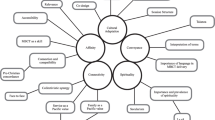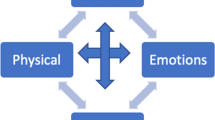Abstract
The current paper provides an overview of the cultural and religious background of Pakistan; the current situation of mental health in Pakistan with special emphasis on cultural adaptation of cognitive behaviour therapy (CBT) in Pakistan. In the context of Sufism- Islamic Mindfulness, it is interesting to note that it has been easy to explain the concepts of CBT to the therapists and clients in Pakistan, but the process to culturally adapt CBT in Pakistani culture, had to be based on patience while generating evidence for it. Our group has taken the responsibility to do that and so far, have been successful in the endeavours pertaining to research and service development, described in this paper.
Similar content being viewed by others
References
Armstrong. (2002). Muslim mindfulness: 9th c. CE. Retrieved from: http://learnshedlive.com/a-brief-history-of-mindfulness/.
Chadda, R. K. (2001). Psychiatry in non-psychiatric settings: A comparative study of physicians and surgeons. Journal of Indian Medical Association, 99, 24–26.
Fadiman, J. (1997). Opportunities galore: How to set goals and achieve them? Revolution 7(1), 88–89.
Farooqi, Y. N. (2006). Traditional Healing Practices Sought by Muslim Psychiatric Patients in Lahore, Pakistan. International Journal of Disability, Development and Education, 53(4), 401–415.
Gadit, A., & Khalid, N. (2002). State of Mental Health in Pakistan: service, education and research. Karachi, Pakistan: Hamdard Foundation, 38–39.
Habib, N., Dawood, S., Kingdon, D., & Naeem, F. (2014). Preliminary Evaluation of Culturally Adapted CBT for Psychosis (CA-CBTp): Findings from Developing Culturally- Sensitive CBT project (DCCP). Behavioral and Cognitive. Psychotherapy, 43(2), 200–208.
Hays, P. I. G., Ed. (2006). Culturally Responsive Cognitive Behaviour Therapy: Assessment, practice and supervision. Washington DC, American Psychological Association.
Husain, N., Afsar, S., Ara, J., Fayyaz, H., Rahman, U. R., Temenson, B., et al. (2014). Brief Psychological Intervention after Self-harm: Randomized controlled trial from Pakistan. British Journal of Psychology, 204(6), 462–470.
Husain, N., Chaudhry, N., Fatima, B., Husain, M., Rizwana, A., Chaudhry, B. I., et al. (2013). Antidepressant and Group Psychosocial Treatment for Depression: A Rater Blind Exploratory RCT from a Low Income Country. Behavioral and Cognitive. Psychotherapy, 42(6), 693–705.
Iwamasa, G.Y, Hsia. C., Hinton, D., Ed. (2006). Cognitive behaviour therapy with Asian Americans Culturally Responsive Cognitive Behaviour Therapy: Assessment, practice and supervision. Washington DC, American Psychological Association.
Karim, N., Ali, A., & Deuri, S. P. (2014). Care burden in epilepsy: A study from northeast India. International Journal of Research and Development of Health, 2, 84–89.
Kenoyer, J. M. (1991). The indus valley tradition of Pakistan and Western India. Journal of World Prehistory, 5(4), 331–385.
Knight, L.F.M. (2007). Mindfulness: history, technologies, research, applications. Pepperdine University. Graduate School of Education and Psychology. Retrieved from: https://allansousa.files.wordpress.com/2009/11/mindfulnessarticleluis.pdf.
Mubashar, M. H., & Farooq, S. (2000). Mental health literacy in developing countries. British Journal of Psychiatry, 179(1), 75.
Naeem, F. (2005). Five months back in Pakistan: Clinical reflections. Psychiatric Times, 22(13), 43–44.
Naeem, F., Ayub, M. (2004) Psychiatric training in Pakistan. Medical Education Online, 9, 19–22.
Naeem, F., Ayub, M., Kingdon, D., & Gobbi, M. (2012). Views of depressed patients in Pakistan concerning their illness, its causes, and treatments. Qualitative Health Research, 22(8), 1083–1093.
Naeem, F., Gobbi, M., Ayub, M., Kingdon, D, (2009). University students’ views about compatibility of cognitive behaviour therapy (CBT) with their personal, social and religious values (a study from Pakistan). Mental Health Religion & Culture, 12(8), 847–855.
Naeem, F., Gobbi, M., Ayub, M., & Kingdon, D. (2010). Psychologists experience of cognitive behaviour therapy in a developing country: A qualitative study from Pakistan. International Journal of Mental Health Systems, 4(2), 2–10.
Naeem, F., Gul, M., Irfan, M., Munshi, T., Asif, A., Rashid, S., et al. (2015). Brief Culturally Adapted CBT (CaCBT) for Depression: A randomized Controlled trial from Pakistan. Journal of Affective Disorders, 177, 101–107.
Naeem, F., Habib, N., Gul, M., Khalid, M., Saeed, S., Farooq, S., et al. (2014). A qualitative study to explore patients, career and health professionals, views to culturally adapt CBT for psychosis (CBT p) in Pakistan. Behavioral & Cognitive Psychotherapy, 44(1), 43–55.
Naeem, F., McGuire, N., & Kingdon, D. (2013). Culturally adapted CBT for depression, therapy manual. [Kindle Ed 2]. Lahore, Pakistan: Pakistan Association of Cognitive Therapists.
Naeem, F., Saeed, S., Irfan, M., Kiran, T., Nasir, M., Gul, M., et al. (2015). Brief culturally adapted CBT for psychosis (CaCBTp): A randomized controlled trial from a low income country. Schizophrenia Research, 164(1–3), 143–148.
Naeem, F., Sarhandi, I., Gul, M., Khalid, M., Aslam, M., Anbrin, A., et al (2014). A multicenter randomized controlled trial of a carer supervised culturally adapted CBT (CaCBT) based self help for depression in Pakistan. Journal of Affective Disorders, 156, 224–227.
Naeem, F., Waheed, W., Gobbi, M., Ayub, M., & Kingdon, D. (2011). Preliminary evaluation of culturally sensitive CBT for depression in Pakistan: Findings from developing culturally-sensitive CBT project (DCCP). Behaviour Cognitive Psychotherapy, 39(2), 165–173.
Nestler, E. J., Barrot, M., DiLeone, R. J., Eisch, A. J., Gold, S. J., & Monteggia, L. M. (2002). Neurobiology of depression. Neuron, 34(1), 13–25.
Padesky, C. A., & Greenberger, D. (1995). Mind over mood: Change how you feel by changing the way you think. New York: Guilford Publications.
Patel, A. D., Gibson, E., Ratner, J., Besson, M., & Holcomb, P. (1998). Processing syntactic relations in language and music: An event-related potential study. Journal of Cognitive Neuroscience, 10, 717–733.
Sahin, N. H., & Sahin, N. (1992). Reliability and validity of the Turkish version of the automatic thoughts questionnaire. Journal of Clinical Psychology, 48, 334–340.
Saravanan, B., Jacob, K. S., Johnson, S., Prince, M., Bhugra, D., & David, A. (2007). Belief models in first episode schizophrenia in South India. Social Psychiatry and Psychiatric Epidemiology, 42, 446–451.
Scorzelli, J., & Scorzelli, M. R. (1994). Cultural sensitivity and cognitive therapy in India. The Counselling Psychologist, 22, 603–610.
Shaikh, B. T., & Hatcher, J. (2005). Health seeking behaviour and health service utilization in Pakistan: Challenging the policy makers. Journal of Public Health, 27(1), 49–54.
Sorsdahl, K., Flisher, A. J., Ward, C., Mertens, J., Bresick, G., Sterling, S., Weisner, C. (2010). The time is now: missed opportunities to address patient needs in community clinics in Cape Town, South Africa. Tropical Medicine and International Health, 15(10), 1218–1226.
Thomas, H., Johnson, M., & Mason, C. (2008). No sign until the burst of fire: Understanding the Pakistan–Afghanistan frontier. European Journal of International Security, 32(4), 41–77.
Author information
Authors and Affiliations
Corresponding author
Ethics declarations
Conflicts of interest
There are no potential conflicts of interest.
Research involving human and animal rights
The paper does not involve a research on human participants and/or animals. The studies mentioned have been discussed as part of the review of literature.
Rights and permissions
About this article
Cite this article
Irfan, M., Saeed, S., Awan, N.R. et al. Psychological Healing in Pakistan: From Sufism to Culturally Adapted Cognitive Behaviour Therapy. J Contemp Psychother 47, 119–124 (2017). https://doi.org/10.1007/s10879-016-9354-3
Published:
Issue Date:
DOI: https://doi.org/10.1007/s10879-016-9354-3




